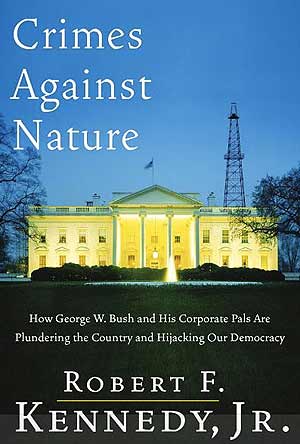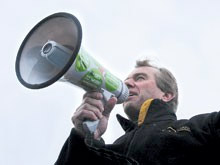Biblio
Covalent has been drilling near Cooperstown, NY. In 2008, it tried to purchase water from the Village of Cooperstown for their deep shale drilling. Jim Austin of The Cooperstown Crier (July 24, 2008) reports that the village board has voted not to move forward with the proposal, and Covalent plans to look to Cortland.
“Personally,” said Trustee Lynne Mebust, “I don’t see an upside for the village.” …
Prior to taking the vote, the board listened to comments from the public, which were largely against the sale of water.
Covalent Energy is a privately held exploration and development company focused on developing domestic and international unconventional energy resources.
In this powerful and far-reaching indictment of George W. Bush's White House, Robert F. Kennedy, Jr., the country's most prominent environmental attorney, charges that this administration has taken corporate cronyism to such unprecedented heights that it now threatens our health, our national security, and democracy as we know it... --from the book jacket.
Robert Kennedy Jr. says we the people have the right to protect our commons.
Photo by Shadia Fayne WoodSee: Sarah van Gelder. Yes Magazine. May 27, 2010. "Protecting our Water Commons: Interview with Robert Kennedy Jr."
van Gelder: How important is the public trust doctrine in enforcing the idea that the waters are a commons and that ordinary people have a right to it?
Kennedy: There are two ancient laws that underlie all modern environmental laws: One is the nuisance doctrine that essentially says you can use your property any way you want, but if you pollute and it escapes your property and goes onto somebody else’s property, you’re violating the law.
The other is the public trust doctrine, which says you can’t do anything that is going to diminish the commons, which includes any property that is not susceptible to private property ownership, like air, water, the fisheries, wetlands, wildlife, the wandering animals, rivers, streams, shorelines, aquifers, underground rivers, etc. Everybody has the right to use the commons, but nobody can use them in a way that diminishes their use and enjoyment by others.
This is ancient law that goes back to Roman times when every citizen—rich or poor, humble or noble, African or European—had a right to cross the beach, throw in a net, and take out a share of the fish. And the emperor himself couldn’t stop them.
The first thing that happens in a tyranny is the privatization of the public trust by powerful entities...
See: Flow - The War Between Public Health and Private Interests
See: Robert F. Kennedy Jr. Feb. 19, 2004. The Nation. "The Junk Science of George W. Bush".
See: Robert F. Kennedy, Jr. Mobilizes on Mountaintop Removal
See: Mountaintop Removal Redux: Bobby vs. Blankenship II
See: New Starpower in the Fracking Fight
See Also:
Barlow, Maude. 2009. Blue Covenant: The Global Water Crisis and the Coming Battle for the Right to Water. The New Press, June 1.
Ivins, Molly. 2003. Bushwhacked : Life in George W. Bush's America. 1st ed. New York: Random House.
Shnayerson, Michael. 2008. Coal River. 1st ed. Farrar, Straus and Giroux, January 8.
The coining of the term eco-terrorism is credited by many to the Executive Director of the Center for the Defense of Free Enterprise, Ron Arnold.
In the aftermath of the September 11 terrorist attacks, the word 'terrorism' has become a potent political weapon. For years Arnold has blurred the boundaries between what constitutes civil disobedience and elevated vandalism to equal terrorism. The conflation of civil disobedience with terrorism is a calculated strategy.
Legislation using the cover of cracking down on 'eco-terrorism' - such as that currently being promoted by the American Legislative Exchange Council - is percolating its way through the legislatures of a number of U.S. states. While vandalism and criminal damage is already illegal, the attraction of such legislation is in defining "terrorism" so broadly as to ban civil disobedience.
One of the most potent tactics employed over the last twenty years in the environment movement has been through organising peaceful civil disobedience protests. Such protests often result in an issue gaining widespread media coverage prompting public discussion of important public issues and, in some cases, resulted in environmental victories.
Groups that have a high media profile also have the ability to successfully raise funds from appeals directly to millions of citizens. For the conservative movement, legislating against civil disobedience under the guise of cracking down on 'ecoterrorism' would dramatically reduce both the media profile and fundraising capacity of groups such as Greenpeace, the Rainforest Action Network and local grassroots groups.
Please note that information taken from Wikis should be verified using other, more reliable sources. It is a good place to start research, but because anyone can edit a Wiki, we do not recommend using it in research papers or to obtain highly reliable information.
- « first
- ‹ previous
- 1
- 2
- 3
- 4









